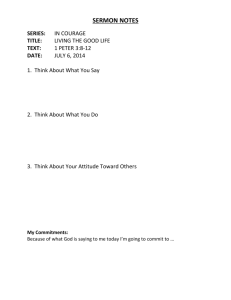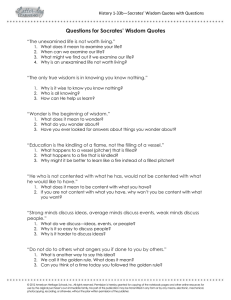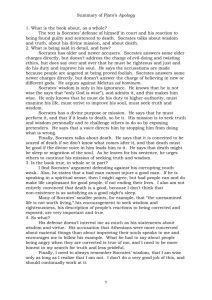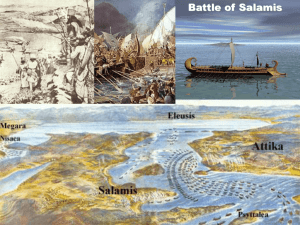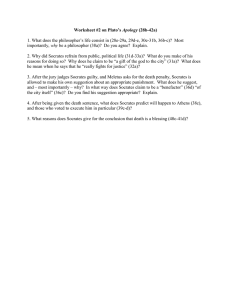Getting Wisdom Ed Langerak Chapel Talk, St. Olaf College, Sept. 24, 1998
advertisement
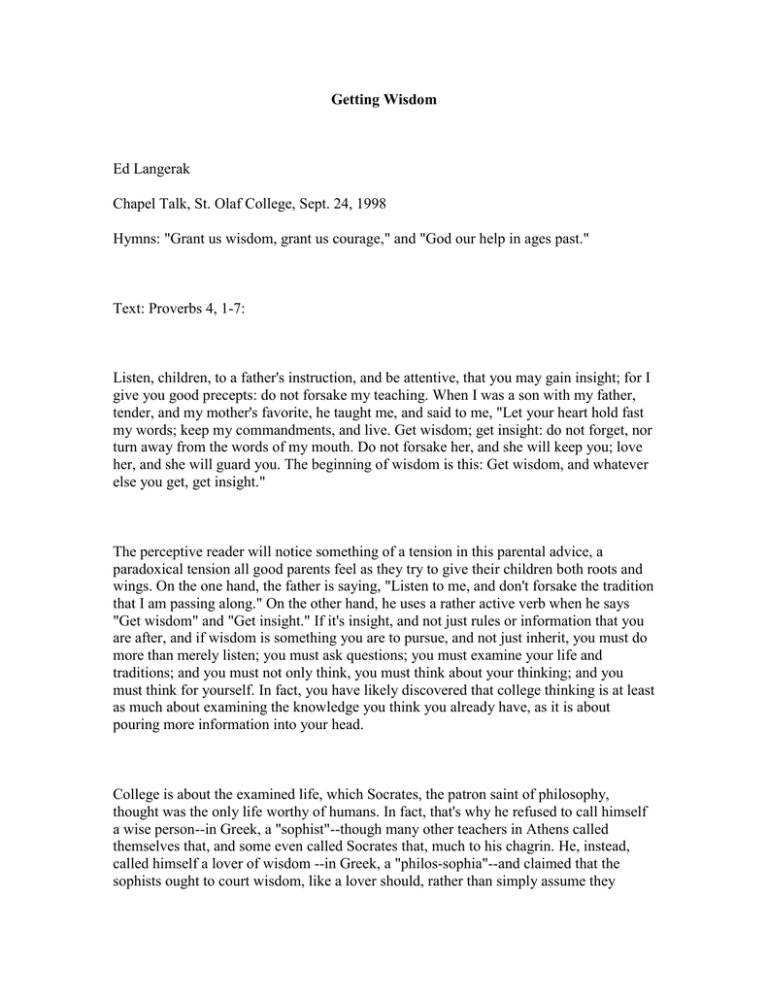
Getting Wisdom Ed Langerak Chapel Talk, St. Olaf College, Sept. 24, 1998 Hymns: "Grant us wisdom, grant us courage," and "God our help in ages past." Text: Proverbs 4, 1-7: Listen, children, to a father's instruction, and be attentive, that you may gain insight; for I give you good precepts: do not forsake my teaching. When I was a son with my father, tender, and my mother's favorite, he taught me, and said to me, "Let your heart hold fast my words; keep my commandments, and live. Get wisdom; get insight: do not forget, nor turn away from the words of my mouth. Do not forsake her, and she will keep you; love her, and she will guard you. The beginning of wisdom is this: Get wisdom, and whatever else you get, get insight." The perceptive reader will notice something of a tension in this parental advice, a paradoxical tension all good parents feel as they try to give their children both roots and wings. On the one hand, the father is saying, "Listen to me, and don't forsake the tradition that I am passing along." On the other hand, he uses a rather active verb when he says "Get wisdom" and "Get insight." If it's insight, and not just rules or information that you are after, and if wisdom is something you are to pursue, and not just inherit, you must do more than merely listen; you must ask questions; you must examine your life and traditions; and you must not only think, you must think about your thinking; and you must think for yourself. In fact, you have likely discovered that college thinking is at least as much about examining the knowledge you think you already have, as it is about pouring more information into your head. College is about the examined life, which Socrates, the patron saint of philosophy, thought was the only life worthy of humans. In fact, that's why he refused to call himself a wise person--in Greek, a "sophist"--though many other teachers in Athens called themselves that, and some even called Socrates that, much to his chagrin. He, instead, called himself a lover of wisdom --in Greek, a "philos-sophia"--and claimed that the sophists ought to court wisdom, like a lover should, rather than simply assume they already possess her. I don't claim that Socrates had the same notion of wisdom as the writer of Proverbs, but he would have appreciated the connotation that it's something one pursues. Of course, highlighting the point that wisdom involves searching rubs against the fatherly admonition that you should listen and never, ever, depart from his advice. As my own father would say about me, and as I say about my own children, "Encourage kids to think for themselves and then, darn it, they do it; and not always well, either." Mistakes are often made, sometimes painful ones, which is why it often seems easier for everyone if students just listen and believe rather than question. As Woody Allen once quiped, "Maybe the unexamined life is not worth living, but the examined life is no picnic either." Or, in the words of Garrison Keiller, "It's not for the timid." Socrates would agree, and he would have appreciated that our hymn linked wisdom and courage, because he thought the lover of wisdom needed lots of courage about convictions. Usually when we think of courage and convictions, we think of the courage to die for them, or--which is sometimes harder--to live for them, or even--which is sometimes easier--to kill for them. Socrates actually valued all these kinds of courage; at his trial, for example, he pointed out that he fought battles for Athens. However, he also thought it was irresponsible to exercise these types of courage about one's convictions without also exercising what he thought was the rarest type of courage about them, which is the courage to examine them. Only examined convictions should elicit the courage to live, or to die, or--especially--to kill for them, or you might end up executing an innocent person. And, of course, that's exactly what happened to Socrates. But in fairness to the Athenian jury, it's important to see why. It's not just that he was martyred for the mistake of exercising academic freedom without first getting tenure; it's also that, for a certain kind of traditionalism, the examined life can actually look like it's corrupting the youth. Indeed, several decades before Socrates took the hemlock, cultural conservative Aristophanes regaled the Athenians with a wildly farcical contrast between the "Old Education" and the new-fangled stuff allegedly going on in what he called Socrates' "Thinkery." He did this in his play entitled, "The Clouds," which, of course, is where he implied Socrates' head was. Here's the defense of the Old pedagogy: Gentlemen, I propose to speak of the Old Education, as it flourished once beneath my tutelage, when Homespun Honesty, Plainspeaking, and Truth were still honored and practiced, and throughout the schools of Athens the regime of the three D's DISCIPLINE, DECORUM, and DUTY - enjoyed unchallenged supremacy. [From the Arrowsmith translation] Music was an important part of the Old education, and the songs that were enthusiastically sung were the ones that inspired patriotism, such as "Athena, Glorious Sacker of Cities." In contrast, the "Thinkery" is portrayed as encouraging students to mock the old values and to develop mental and rhetorical skills that could get you out of whatever legal pickles you might squeeze yourself into. Here's the new fangled appeal: [again from Arrowsmith] "Very well then, consider your natural needs. Suppose...you commit some minor peccadilo, a little adultery, say, or seduction, and suddenly you find yourself caught in the act. What happens? You're ruined, you can't defend yourself (since, of course, you haven't been taught how). But follow me, my boy, and obey your nature to the full; romp, play, and laugh without a scruple in the world...." knowing that you've learned how to make clever distinctions that can throw any starry-eyed prosecutor for a loop. Unfortunately, Aristophanes unfairly associated Socrates with the Sophists, many of whom could be accused of getting rich by teaching such stuff. However, it's important to notice that what Socrates did nurture--the disposition to examine traditional convictions-was probably just as threatening to those whose first love was order and decorum, or rousing renditions of "Athens, glorious sacker of cities." You have the opportunity to learn more about this point this very evening. St. Olaf is very fortunate to have on campus today one of the best philosophers in the country, Martha Nussbaum. This afternoon she will lead a faculty discussion of her new and much acclaimed book, Cultivating Humanity, and this evening at 7:30 in Holland Hall 501 she will talk about "Liberal Education and World Citizenship." I strongly encourage you to attend. Nussbaum begins Cultivating Humanity with the very contrast in Aristophanes that I have described between the Old and New pedagogies and between the satire and what Socrates actually taught. Indeed, at least half of what I've said about that is gratefully borrowed from her. She calls for a Socratic education, and one with a global perspective, and argues that at least three capacities are necessary: (1) The ability to critically examine oneself and one's traditions. (2) The ability to see oneself as bound, not just to a local region or group, but also to all other human beings, by ties of both recognition and concern. (3) The narrative imagination that enables one to think and feel what it might be like to be a person very different from oneself. I urge you to earn more of what these involve tonight. But for now, notice that such an education is not geared primarily to keep you on the straight and narrow as defined by your father's advice or by your tradition. And, as gets asked every time you see "Fiddler on the Roof," if not simply tradition, what else will guide you as you court wisdom? One answer is that reason can be your touchstone. This may be Nussbaum's own answer, since she says we should live "a life that questions all beliefs and accepts only those that survive reason's demand for consistency and for justification" (p 9). Others, myself included, think it may be more difficult than that, since what people find reasonable is so often affected by context. In particular, I am persuaded by such teachers as Moses, the prophets, Jesus, and St. Paul, that what we think we know and what we think is reasonable is deeply influenced by our desires, and our desires, in turn, are largely shaped by what we love. I don't think this is true of all our beliefs--we often are brought to believe things that are independent of or even against our desires. But I think it's true of many of our most important beliefs, especially the moral, religious, and political ones that are central to our humanity and our loyalties. St. Augustine, the early Christian philosopher and theologian, was so persuaded of this point, that he thought you could not think clearly or reasonably on most important issues unless you had the right loves, and thereby have the right desires. Moreover, he thought that if you just got your love life straightened out, your head would generally take care of itself on such matters, which is why he went so far as to say: "If you love rightly, then you may do as you please." At issue here are not only the kinds of love involved--you may know that the Greeks had more distinctions and words for types of love than we do--but also whom one loves. In particular, Augustine thought that an overriding love for oneself would darken one's reasoning, and that proper love for God and neighbor would enlighten it. Contemporary theologian Langdon Gilkey wrote a book about his experiences in a WW II prison camp called Shantung Compound, a camp where he had the unenviable task of trying to get frightened inmates to think objectively about which of them most needed or deserved the scarce resources. He believes he confirmed Augustine's view by discovering that unselfishness is the prerequisite for using reason rightly, not the result of using it rightly, as so many philosophers contend (p 93). Thus he would say with St Paul that love is at least as important as courage when one is out to get wisdom and get insight. Well, if it's true that college thinking requires courageously examining your nearest and dearest beliefs, and also that doing so reasonably requires a proper and healthy love-life, then at college both your head and your heart may seem up for grabs; no wonder you sometimes get an upset stomach, or seem lost, or face intellectual, psychological, or spiritual crises. But, as my neighbor Paul Zorn recently reminded the faculty, the Chinese character for "crisis" is the same as that for "opportunity." So I would like to share a few ideas about how the examined life can be, if not a picnic, at least as much opportunity as crisis. The main requirement, I think, is to embrace intellectual humility. Socrates went too far in saying that the one thing he knew for sure is that he knew nothing, but he was right in thinking that the main barrier to increased insight is not ignorance but assumed knowledge. Humility is not a sense of unworthiness, but the confidence to be teachable. This includes the ability to admit you might be wrong, and the willingness to learn whatever you can from those you disagree with. Intellectual humility is open-minded enough to recognize that even those one thinks are wrong, may still have a reasonable case for their views. Such humility is quite compatible with making firm commitments. True, you may have to admit some uncertainty or doubt, but I agree with those who say that mature faith differs from naive belief in that it incorporates inevitable doubts into commitments that are deep without being merely bull-headed. Throughout our lives we have to make commitments before all the data is in--choosing a major, a career, perhaps a marriage, or having children. Rarely will you be absolutely sure you are right. But if Soren Kierkegaard is wise (and an entire library on campus testifies that many of us think he is) it's actually a good thing that our commitments aren't simply the conclusions of sound syllogisms--it gives us something to work on rather than simply fall into. Notice that commitments in the midst of uncertainty are fully compatible with covenantal fidelity and trustworthiness, and maybe even conducive to them. Of course, insofar as commitments involve truth claims, and insofar we are willing to examine these claims, intellectual honesty requires the real possibility of changing our views, even on very important matters. However I believe that liberal education is enhanced by adopting what I'll call "cognitive conservatism"; the mere fact that you find some difficulties with your view is not sufficient grounds for giving it up. All views have difficulties, including--perhaps especially--skepticism and relativism. This doesn't mean one should never be willing to abandon a view; that would not be intellectually honest. But it does mean, I think, that one should change only when one is convinced that another view is clearly superior. And exciting alternative views should be examined at least as rigorously as the tradition one is raised within. Maybe we shouldn't take advice just because it comes from our parents, but we shouldn't look down on it for that reason either. So sometimes we will be caught between conflicting considerations. That's OK; it's better to live with good and abiding questions than shallow and quick answers. Let's celebrate the fact that the story of most of our lives fits the genre not of epic, or of tragedy, or even of comedy, but of "quest." A quest is not a pilgrimage in which we have found all the answers and our only job is to exercise courage and perseverance as we stay on a predetermined path, using our tradition like one of those travel guidebooks complete with the ranking stars that tell us exactly where to go and what to do and see and what not to do and see. Rather a quest is a sojourn in which questions arise and the destination unfolds as the journey evolves; and we perhaps even decide to meld somewhat the distinction between destination and journey, as we exercise courage and perseverance, to be sure, but also curiosity, a sense of humor, and a tolerance for ambiguity, using our tradition as insightful stories from previous trustworthy travelers that can provide lots of wise guidance. Not everything we encounter on our quests should be treated as problems to be solved. Sometimes we encounter mysteries to be experienced, and savored rather than solved. This is especially true for our spiritual life, I think. Remember that right loving may often be a prerequisite for right thinking, even for accurate seeing. So, if you encounter experiences that seem to help you love more deeply and wisely, those are experiences to cherish. They may be gifts of grace calling more for gratitude than explanation. This is not a plea for unexamined religiosity--that would be spiritually dangerous as well as intellectually dishonest. But this is the recognition that nurturing what's valuable is as important as examining it, and balance is needed. One of my favorite novelists, the late Peter DeVries, conveys that the examined life makes us very good at seeing through things, including seeing through ourselves and seeing through each other. This can be very helpful, since it can expose and correct lots of ignorance and deception. But DeVries says that we are here less to see through one another than to see one another through, something academics can lose sight of. I think we can and must do both of these, and I agree with St. Augustine that we won't do the former well unless we do the latter well. In short, get wisdom and get insight by getting good at examining your life and your tradition, but don't neglect to cultivate a proper and good love-life.
